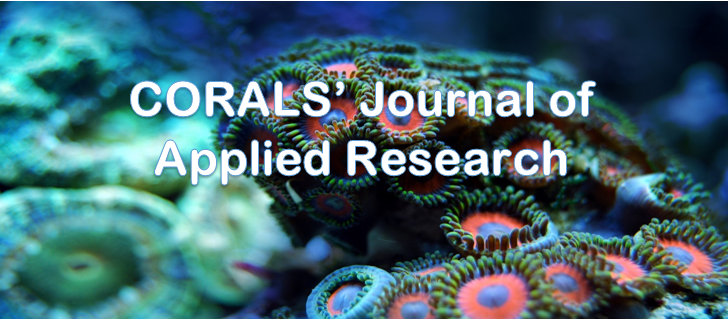
C'JAR's Scope, Policies, Process, and Prices

C’JAR: Nurturing Knowledge, Fostering Excellence
Scope and Focus
CORALS’ Journal of Applied Research (C’JAR) is your gateway to a diverse realm of applied research. We welcome theoretical and applied articles, ensuring a seamless connection between theory and practical applications. Our focus spans various research methods, including statistical analysis, qualitative explorations, case studies, Delphi studies, and more.
The Post-Doc Mission
C’JAR is committed to bringing doctoral research to life. For post-docs seeking their first publication platform and faculty members requiring published work, C’JAR is your go-to open-access journal. We bridge the gap between dissertations and scholarly articles.
Pragmatism and Practicality
All papers should include a section describing its application to real-world practice.
Submission Process, Article Review Process, and Fees
Submission Process
Formatting Guidelines: All articles should adhere to APA 7 formatting.
Cover Page Details: Include a cover page with the title, author credentials, brief biography, contact information, and submission statement: “By submitting this article, the authors agree they have read and will follow the policies and procedures of C’JAR as noted in the submission policies information.”
Exceptional Tables and Figures: Tables and figures should align with numbers and titles, ensuring clarity and legibility. Place tables and figures where they belong in the paper. Use APA guidance for format and notes.
Abstracts and Keywords: Follow APA guidelines for abstracts and provide relevant keywords for effective search engine indexing.
Submission Fee: A non-refundable Article Submission Fee (ASF) of $100 covers plagiarism scanning and peer review services. (C'JAR pays their peer reviewers).
Formatting/Style/Quality: Submit an MS Office Word file. Do not use manual line spacing – use the Word feature. Grammar and spell-checking are encouraged. If significant editing is needed, CORALS LLC can provide that for a separate (and bundled) fee. An estimate can be provided upon request.
Article Submission and Review
Initially, the Editor-in-Chief or the Associate Editor in charge of Production will read your article to determine its applicability to C'JAR's scope. They remove authors' names throughout the document to submit for review. If your article meets the criteria for the scope, you will receive the $100 nonrefundable initial submission fee invoice. Once paid, the review process begins.
-
Double-Blind Peer Review: Articles undergo a double-blind review, ensuring unbiased evaluation.
-
Reviewer Rubric: Peer reviewers assess method, design, analysis, and application to practice, among other criteria.
-
Decision Process: We provide accept, revise, or reject decisions accompanied by constructive feedback.
-
Rolling Submissions: The article will be submitted for production in the current issue as soon as the "accept" decision is received and all editing requirements are met.
-
Time Frames: No guaranteed times are provided. Peer reviewers are asked to complete the review within 3-4 weeks after submission, but sometimes takes longer. The typical time from submission to publication (if minor edits are needed) is 2-4 months. This estimate does not include conversions (dissertation to article) done by CORALS LLC.
-
Acceptance Rates: We do not guarantee acceptance but work with authors to help revise to the acceptance level.
Article Processing Fees (APF)
-
Flat Rate: We charge a flat rate $500.00 for APF, for articles that are any length up to 13,000 words. For articles longer than 13,000 words, please email us (coralsjar@gmail.com) for a price.
-
Payment Plans: Payment plans are discussed, but full APF payment is necessary before publication.
-
Proof Review: Authors review article proofs before publication, ensuring accuracy. A two-week author review timeframe is requested.
Open Access Policy
C’JAR proudly provides immediate open access, promoting global dissemination of research. Authors adhere to Creative Commons licensing (CC BY-NC-SA), fostering collaboration and innovation. This license lets others remix, adapt, and build upon your work non-commercially if they credit you and license their new creations under identical terms. You warrant to C’JAR that you have obtained all required permissions for any copyrighted items in your work upon submission of your APF.
Ethical Publishing Practices
-
Plagiarism/Data Fraud: C’JAR maintains a strict policy against plagiarism and fraudulent data, ensuring the integrity of published work.
-
Retractions and Corrections: Articles found with errors undergo corrections, and retractions occur only in cases of serious ethical violations.
C’JAR will never knowingly publish an article that contains plagiarism or fraudulent data. Authors will receive a notice of any allegations post-publication and will be expected to participate and assist in the investigation. The article will be removed from publication with a note stating, “Article removed temporarily.” If data fraud or plagiarism determinations are made, "Article permanently removed" will replace the article’s website location. If corrections can fix the errors, the article can be repaired and republished, with a note explaining that the article was modified.
Note that retracted articles, for any reason, do not receive APF refunds. Further, C’JAR will not be held responsible for any data fraud or plagiarism findings. The sole remedy for plagiarism or other fraud results will be article removal.
Journal Funding
C’JAR is sustained through Article Submission Fees (ASFs), Article Processing Fees (APFs), donations, CORALS LLC support, and online advertisements. For advertising inquiries, contact us at CORALSJAR@gmail.com.
Empower your research journey with C’JAR - Where Knowledge Meets Impact





